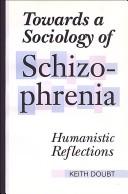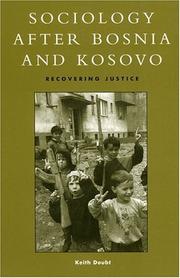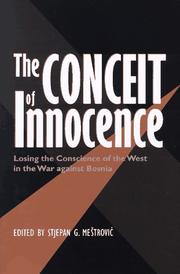| Listing 1 - 10 of 10 |
Sort by
|

ISBN: 1281997412 9786611997410 144268271X 9781442682719 0802008453 0802078303 9780802078308 9780802008459 9781281997418 Year: 1996 Publisher: Toronto
Abstract | Keywords | Export | Availability | Bookmark
 Loading...
Loading...Choose an application
- Reference Manager
- EndNote
- RefWorks (Direct export to RefWorks)
"Schizophrenia, at one time considered by many clinicians to be a psychological response to oppressive upbringing, is now generally accepted as a physical illness. While Keith Doubt does not quarrel with this current view, he does challenge the positivistic assumptions that tend to accompany it. Throughout this fascinating survey of the literature on schizophrenia, Doubt presents a critique of society's neglect of those afflicted and promotes a humanistic understanding of them." "Doubt draws on several disciplines and uses the works of such diverse writers as Vygotsky, Piaget, Deleuze, Laing, and Torrey. While he rebukes medical practitioners for ignoring the social dimensions of schizophrenia, he is equally critical of post-modernism's tendency to valorize the mentally ill. Nor does he sympathize with particular sociological approaches which, he believes, emphasize society's reactions to the illness - often at the expense of the afflicted person. Thus, a major part of Doubt's project is to place the individual at the centre of sociological theorizing about schizophrenia." "This thought-provoking study offers an alternative perspective on schizophrenia to scholars and professionals, as well as to those who live with the disease. Doubt offers practical recommendations, which he hopes will bring relief to sufferers, and helpful insights to those engaged in treating or assisting people with schizophrenia."--Jacket.
Book
ISBN: 9789633860618 963386061X 9789633860601 9633860601 9633862469 9789633862469 Year: 2014 Publisher: Budapest, Hungary ; New York, New York : Central European University Press,
Abstract | Keywords | Export | Availability | Bookmark
 Loading...
Loading...Choose an application
- Reference Manager
- EndNote
- RefWorks (Direct export to RefWorks)
This book is not about war crimes, crimes against humanity, genocide, evil, or the killing of a society. It is about a cultural heritage, something vital to a society as a society, something that was not killed in the previous war, something that is resilient. "Through the Window" brings an original perspective to folklore of Bosnians at a certain period of time and the differences and similarities of the three main ethnic groups in Bosnia and Herzegovina. It examines the transethnic character of cultural heritage, against divisions that dominate their tragic recent past. The monograph focuses in particular on customs shared by different ethnic groups, specifically elopement, and affinal visitation. The elopement is a transformative rite of passage where an unmarried girl becomes a married woman. The affinal visitation, which follows, is a confirmatory ceremony where ritualized customs between families establish in-lawships These customs reflect a transethnic heritage shared by people in Bosnia as a national group, including Bosniaks, Serbs and Croats.
Bosnians --- Marriage customs and rites --- Women --- Marriage --- Elopement --- Ethnology --- Secret marriage --- Married life --- Matrimony --- Nuptiality --- Wedlock --- Love --- Sacraments --- Betrothal --- Courtship --- Families --- Home --- Honeymoons --- Human females --- Wimmin --- Woman --- Womon --- Womyn --- Females --- Human beings --- Femininity --- Bridal customs --- Manners and customs --- Rites and ceremonies --- Weddings --- Marriage customs and rites. --- 19th century, 20th century, Bosnia, Elopement, Ethnic relations, Ethnography, Marriage, Women. --- Elopement-Bosnia and Herzegovina. --- Marriage-Bosnia and Herzegovina. --- Women-Bosnia and Herzegovina. --- Marriage customs and rites-Bosnia and Herzegovina. --- Bosnians-Marriage customs and rites.

ISBN: 0847693775 Year: 2000 Publisher: Lanham (Md.) : Rowman and Littlefield,
Abstract | Keywords | Export | Availability | Bookmark
 Loading...
Loading...Choose an application
- Reference Manager
- EndNote
- RefWorks (Direct export to RefWorks)
Kosovo War, 1998-1999 --- War and society. --- Yugoslav War, 1991-1995 --- Social aspects.
Periodical
Year: 2006 Publisher: Springfield, OH : Keith Doubt,
Abstract | Keywords | Export | Availability | Bookmark
 Loading...
Loading...Choose an application
- Reference Manager
- EndNote
- RefWorks (Direct export to RefWorks)
Since 1992 --- Bosnia and Herzegovina --- Bosnia and Herzegovina. --- History --- Ethnic relations --- Social aspects --- History and criticism
Book
ISBN: 9780823293483 Year: 2022 Publisher: New York, NY
Abstract | Keywords | Export | Availability | Bookmark
 Loading...
Loading...Choose an application
- Reference Manager
- EndNote
- RefWorks (Direct export to RefWorks)

ISBN: 9780823293483 9780823227006 Year: 2022 Publisher: New York, N.Y. Fordham University Press
Abstract | Keywords | Export | Availability | Bookmark
 Loading...
Loading...Choose an application
- Reference Manager
- EndNote
- RefWorks (Direct export to RefWorks)

ISBN: 0823227006 0823227022 0823235874 1429479175 Year: 2006 Publisher: Fordham University Press
Abstract | Keywords | Export | Availability | Bookmark
 Loading...
Loading...Choose an application
- Reference Manager
- EndNote
- RefWorks (Direct export to RefWorks)
Digital
ISBN: 9789633860618 Year: 2014 Publisher: Budapest ;; New York Central European University Press
Abstract | Keywords | Export | Availability | Bookmark
 Loading...
Loading...Choose an application
- Reference Manager
- EndNote
- RefWorks (Direct export to RefWorks)


ISBN: 9780890967706 Year: 1997 Publisher: College Station (Tex.) A&M University Press
Abstract | Keywords | Export | Availability | Bookmark
 Loading...
Loading...Choose an application
- Reference Manager
- EndNote
- RefWorks (Direct export to RefWorks)
Digital

ISBN: 9781442682719 Year: 2016 Publisher: Toronto, Ont. University of Toronto Press
Abstract | Keywords | Export | Availability | Bookmark
 Loading...
Loading...Choose an application
- Reference Manager
- EndNote
- RefWorks (Direct export to RefWorks)
| Listing 1 - 10 of 10 |
Sort by
|

 Search
Search Feedback
Feedback About UniCat
About UniCat  Help
Help News
News